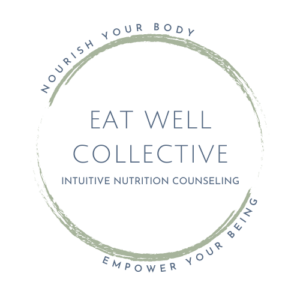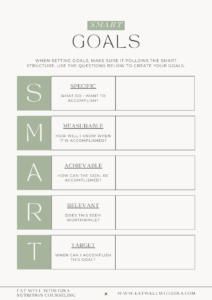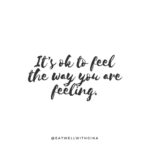Have you ever made a New Year’s resolution only to find yourself feeling ashamed and disappointed in yourself if you did not achieve it by the time it was ready for you to make a new one? This never ending cycle is one that many people find themselves in, especially when faced with the pressures of diet culture amplified by social media’s persuasive tactics to either present ourselves a certain way or work towards something we may not even truly want.
Here at Eat Well with Gina, we’re encouraging everyone to use the ending of this year to take a different approach. Reflect on your successes and setbacks this year in a way that honors the steps you have taken to become a more healthier you and appreciation the lessons learned from any setbacks you faced. It will most likely be challenging to shift that mindset, but practice taking “I failed this year” or “I should have done better” out of the vocabulary and reframing it with “I have learned a lot this year, and even though I did not achieve all of my goals, I can take what I have learned into the new year to see what I want to keep working on or maybe try a new way to work towards my goals.”
Once you take the necessary time to reflect on your year, begin to think about what you want to either continue to work on or shift your focus to in this next year. Think about what you have learned about yourself this past year and where or what you would like to head towards this new year. SMART goals can be a helpful alternative to resolutions as a way to achieve your goals and also reflect on how relevant and realistic to your life they are. Remember that these goals can evolve over time; use these as a starting point to continue to reflect on over the course of the calendar year.
What even is a SMART goal?
A SMART goal is a useful tool to help us define our goals to make them more realistic and achievable in our everyday, busy lives.
Specific: What is the goal? How will I plan to accomplish it? Will anyone else be involved?
Measurable: How will I know that I have accomplished this goal?
Achievable: Is this goal achievable? Does it feel realistic and do-able? Is there anything that may be an obstacle, and how can I plan to overcome that?
Relevant: How is this goal relevant to my life? How will it help me? Am I making this goal because I feel like I should or because it would truly benefit an area of my life?
Target: What can I do today to work towards my goal? Can I set an intention for tomorrow if I did not follow through on this goal today?
Here’s an example of one of our SMART goals for 2023:
Specific: The goal is to engage in a mindfulness breathing activity using an app as a guide.
Measurable: Practice mindfulness for at least 5 minutes when waking up at least 2x/week.
Achievable: Yes, this feels like a realistic starting point. We can also choose to adjust this goal later in the year.
Relevant: This activity will help ground us and continue staying present throughout our day.
Target: Today, we can engage in a mindfulness activity in the afternoon if we were running late in the morning and did not engage in it, or we can set an intention to engage in one tomorrow morning, remembering that the goal is progress, not perfection.
Now, it’s your turn!
Click to download our free worksheet!




